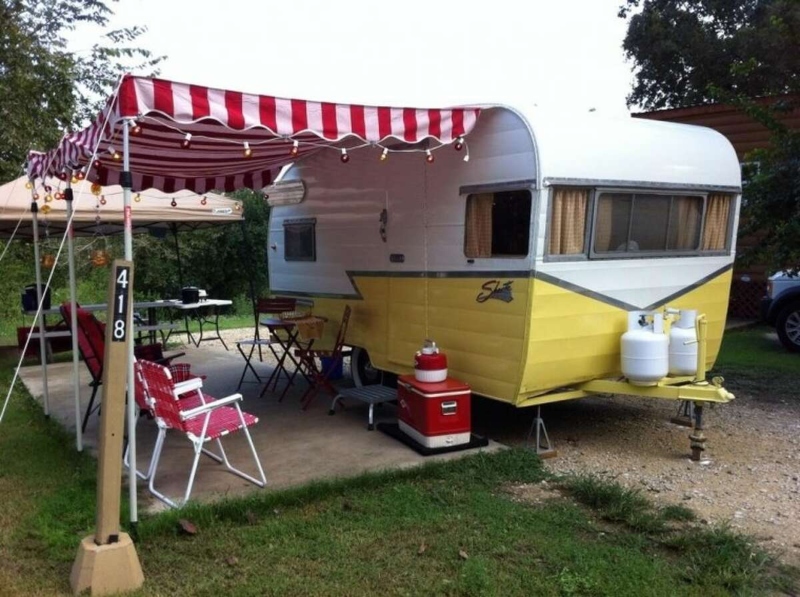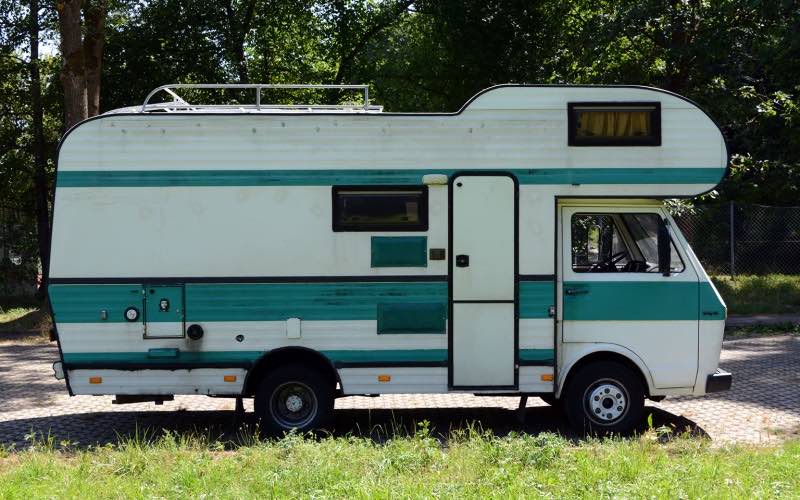Thanks for your support! If you make a purchase using our links in this article, we may make a commission. And, as an Amazon Associate, I earn from qualifying purchases. See the full disclosure here.
RVing is a great way to see the country and enjoy the outdoors, but there are some downsides to the nomadic lifestyle. The RV 10-year rule is one of the biggest RVing headaches for RVers who love older campers, schoolies, or travel trailers from previous eras.
In this article, we clear up the confusion about the RV 10-year rule. We’ll explain how the rule works and show you how to possibly get an exception. If the RV 10-year rule becomes a barrier to your plans, you’ll learn about some alternatives to prevent canceling your vacation plans.
What is the RV 10-Year Rule?
Some RV parks and resorts have an RV 10-year rule that prevents RVers from making a reservation with a rig that’s 10 years old and older. The rule ensures that only newer, presentable RVs are allowed at these facilities.
However, many RVers believe this rule is unreasonable and outdated. After all, a well-maintained RV over ten years old can be just as clean and well-kept as a brand-new RV.
While the RV 10-year rule may seem arbitrary, it’s actually based on several factors, including insurance liability and the condition of the RV. Many RVers believe that the RV 10-year rule is an unfair practice that creates a frustrating barrier to the full range of camping experiences.
Luckily, there are a few ways to get around the RV 10-year rule, so if you own or plan to buy an older RV, there are still plenty of RV vacation opportunities to use it.
Who Uses This Rule?
The RV 10-year rule is most commonly used by privately owned RV parks and resorts exclusive to Class A coaches. For example, one website states:
Coaches that are over 10 years old may not be allowed, based on the discretion of the Resort Manager. We know there are some beautiful older coaches out there, and we welcome them.
Hilton Head Island Motorcoach Resort Website
However, the RV 10-year rule isn’t limited to motorcoaches. Another RV resort that’s open to any RV class says:
RVs must be 10 years old or newer and 26 feet or longer. Vehicle/home must be self-contained, well-kept, and in good condition. Exceptions are only at the discretion of management.
Roberts Resorts Website
Why Do Campgrounds Use the RV 10-Year Rule?
The RV 10-year rule originated in the late 1990s as a response to RVers dumping old, dilapidated RVs in camping spots. These irresponsible RV owners were leaving the park to deal with the expense of disposing of the coach.
RV Park owners also noticed fluid leaks, filthy conditions, and other maintenance issues with older rigs. These RVers were not only leaving a mess for the management to deal with but also causing damage to the RV park’s property.
As a result, RV parks began implementing the RV 10-year rule to weed out RVers with old, poorly maintained RVs creating eyesores and damaging parks’ reputations.
Is the RV 10-Year Rule Always Enforced?
The RV 10-year rule isn’t always strictly enforced. Most times, RV parks will make exceptions for well-maintained and clean RVs, regardless of the RV’s age.
However, it’s important to remember that RV parks are under no obligation to make exceptions to the rule. Therefore, if a park has a strict RV 10-year policy, it’s best to respect the policy and find another RV park that better suits your needs.
Is the RV 10-Year Rule Even Legal?
Think of the RV 10-Year rule as legal as Homeowners Associations (HOAs) rules. Just like HOAs, RV parks can set their own rules and regulations. So, if an RV park decides it only wants RVs that are less than 10 years old, it has every right to do so.
Of course, this rule can be frustrating for RVers with well-maintained, older RVs. But, unless RV parks change their policies, which is unlikely, the RV 10-year rule is here to stay.
Should I Not Buy an RV Older Than 10 Years Old?
If an RV park has a 10-year rule, that doesn’t mean you should avoid buying an RV over 10 years old. In fact, there are several benefits to buying older RVs.
RVs depreciate quickly, so you can find great deals on used RVs that are only a few years old. They built older RVs to last and can often provide decades of service if they’re well-maintained.
Additionally, older RVs often have more personality than their newer counterparts and can be customized to better suit your needs.
And buying an older RV can be a better economical choice, freeing up more of your budget to enjoy the open road.
Of course, there are also some drawbacks to buying an older RV. For example, older RVs may not have all the latest features and amenities that new RVs have. And they may require more maintenance and repairs.
But if you’re willing to take on these challenges, buying an older RV can be a great way to save money and still get an impressive vehicle.
4 Tips for Working Around the RV 10-Year Rule
If your RV is older than ten years, you may feel stuck between a rock and a hard place. On the one hand, you don’t want to get rid of your RV just because some RV parks have a 10-year rule.
But you also don’t want the hassle of being denied a reservation and having to explain why they should admit your RV. If you find yourself in this situation, there are a few things you can do to work around the RV 10-year rule.
1. Keep Your RV Well Maintained and Presentable
One of the best things you can do to maintain the value of your RV is to keep it well-maintained and presentable. To keep your RV in tip-top shape, clean it inside and out regularly and make necessary repairs promptly.
It’s also essential to keep up with routine maintenance, such as checking the tire pressure and batteries. In addition, keeping your RV well-maintained will look and operate like new, which may encourage RV parks not to notice you have an older RV.
2. Ask The Park Manager for Exceptions
Sometimes, you may be able to get around the RV 10-year rule by simply asking the park manager for an exception. For example, if you have a presentable RV and you’re a good customer, the park manager may make an exception, especially if you’re a member of one of the RV clubs they honor.
For example, in a recent forum post regarding the rule, someone wrote:
In many cases, it is just a screening process. We recently stayed in a park that had a “10-year rule” with our 2005 [RV]. When we made the reservation, they asked if there was any duct tape holding things together or graffiti on the coach. They said they would inspect the coach on our arrival. They didn’t.
RVi2 comment
And another suggested:
If your coach doesn’t look like it was towed in from a homeless encampment, you shouldn’t have too many issues making a reservation and staying at one of those sites.
RVi2 comment
Of course, there’s no guarantee that the park manager will say yes. But it’s always worth asking.
3. Offer to Send Photos and a Video of Your RV as Proof
If the RV park is adamant about not allowing older RVs, you might convince them to make an exception by sending photos and videos of your RV to prove it’s in good working order.
Take photos and a video of the RV’s exterior and interior. Highlight any special features or amenities it has. Be sure to include close-ups that show the RV is clean and well-maintained. You may also want to include a short video tour of the RV.
Once you have the photos and video, send them to the RV park manager with a polite request to make an exception for your RV.
4. Alternatively, Stay Somewhere Else
You will find that more RV parks don’t enforce the RV 10-year rule than do. And the ones that do are usually costly and exclusive to luxury Class A, fifth wheels, and travel trailers.
One way to get around the rule is to find RV parks and campgrounds that don’t have the rule in place. Thousands of RV parks across the country will embrace you with open arms. So why struggle to get into the ones that don’t?
Remember that public campgrounds such as County, State, and National Parks don’t have RV age-restriction rules.
Can You Be Turned Away From an RV Park for an Old RV?
RV parks are businesses; like any business, they have the right to choose their customers. Unfortunately, this means they can turn away RV owners with older RVs.
Should this happen to you, and there are no exceptions, your best course is to not take it personally. Look for another RV park that doesn’t have the RV 10-year rule.
The RV 10-Year Rule is Not As Common As It May Seem
The RV 10-year rule isn’t as common as it may seem. In fact, most RV parks don’t have such a rule in place. The ones that do are usually very expensive and located in RV-friendly states such as Florida.
If your RV is over 10 years old, don’t worry. You should have no problem finding an RV park to accommodate you.
Is the RV 10-Year Rule Here to Stay?
Unfortunately, it appears the RV 10-year rule is not only here to stay but may become more common in the upcoming years.
As RV parks and campgrounds become more upscale, they’re increasingly catering to RV owners with newer, more expensive RVs. This trend is likely to continue as the RV industry grows.
Hopefully, RV park management and RVers will find some common ground and work together to find RV camping accommodations for all.
Final Thoughts On The RV 10-Year Rule

For those unfamiliar with the RV 10-year rule, many become confounded and frustrated when RV parks and campgrounds tell them their RV is too old for a reservation.
As RVers, we love our RVs, give them pet names, and treat them like family. So, it’s only natural we get upset when we feel RV parks discriminate against our beloved homes on wheels.
But there’s good news here as the RV 10-year rule isn’t as prevalent as it may seem. In fact, most RV parks don’t have an age restriction for RVs; if they do, there’s still a good chance they’ll provide you with an exception.
The bottom line is to go about your traveling experience and not fret about the RV age restrictions. And hopefully, as more RVers take to full-time RVing, RV parks and campgrounds will employ flexibility, understanding, and even compassion for those endearing “older” rigs we love so much.

